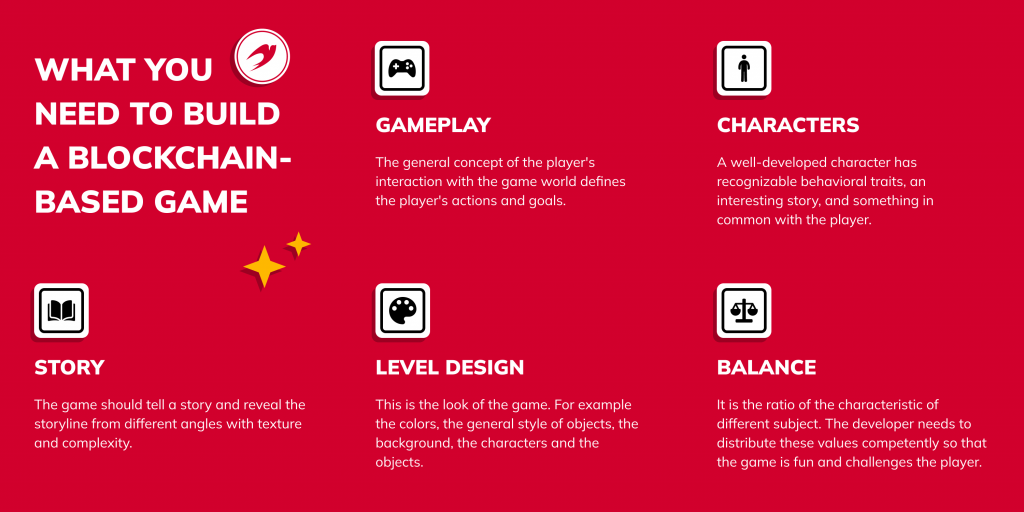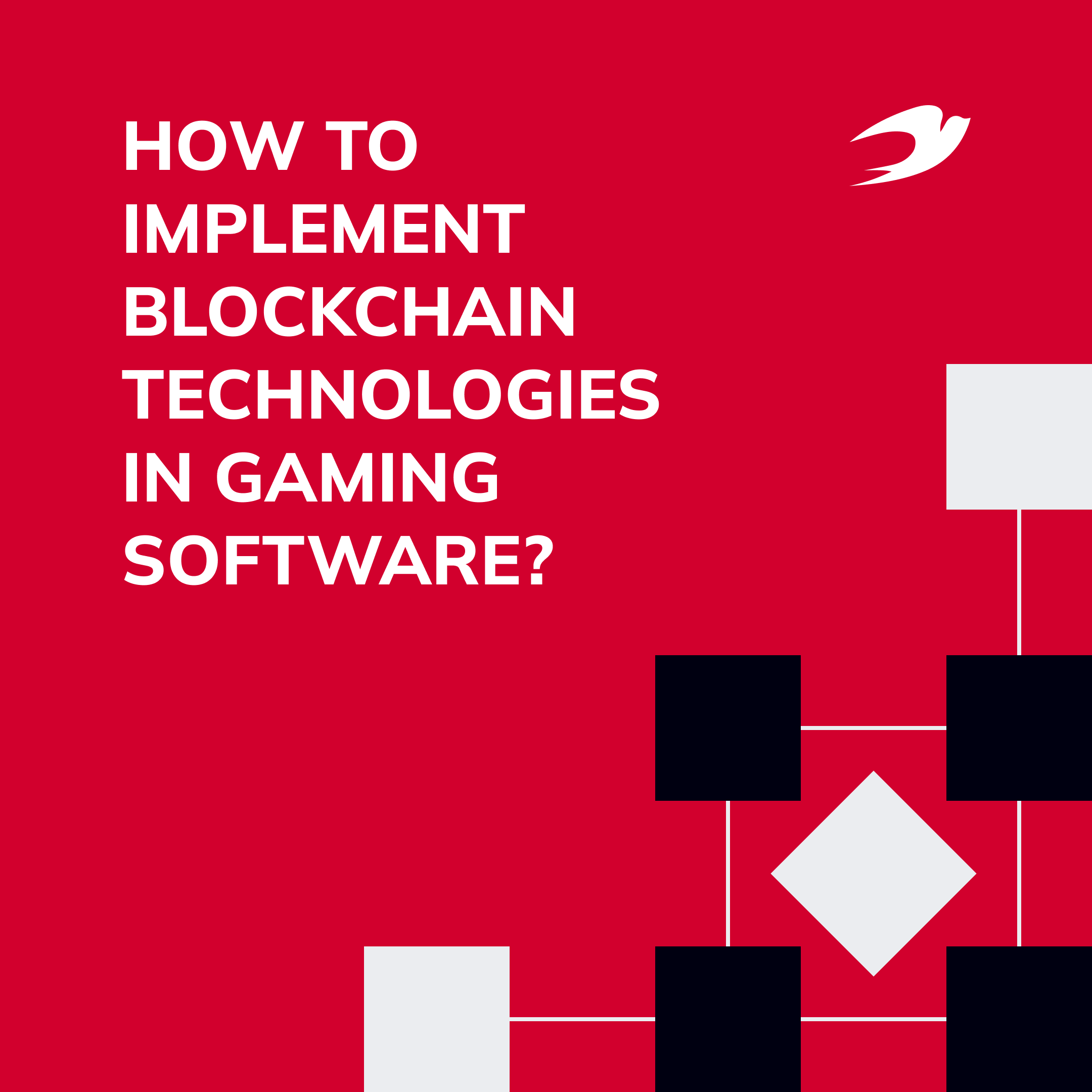Today, games are not only a way to have fun but also a way to make money. As the idea of a meta-universe becomes popular, we are on the verge of a new digital economy where games are connected to investments and even more advanced technologies.
Blockchain is one of the most promising ways to manage such ecosystems. In this article, we will look at how blockchain can transform gaming and how to implement those transformations.
Looking for a reliable team to develop your own blockchain game?
Let us help you and correctly draw up the requirements for your project! Leave your information and our tech specialist will be in touch within a day
Table of Content:
- How blockchain can involve on the gaming industry?
- How is the gaming industry transforming using Blockchain technology?
- Limitations of blockchain technology in gaming
- What do you need to develop a blockchain-based game?
- Strategy of the Gaming project
- Wrapping Up
How blockchain can involve on the gaming industry?
Blockchain-based games have been a novelty over the last two years that will undoubtedly evolve. The proof is the multi-million dollar investments from large and significant funds into the market. For example, Dapper Labs raised $11.2 million from investors to develop GameFi. Video card manufacturer AMD has joined an association to promote blockchain in games. And Samsung added a blockchain-based game to the built-in cryptocurrency wallet of the Galaxy S10. These are all extremely revealing cases.
The gaming market has been waiting for blockchain technology for a long time. It solves many problems, especially in free-to-play games. These are games where users play for free and buy something to gain specific advantages over other players, for example, gold, crystals, and other items.
The main advantages of blockchain in games are:
- Increased user security and privacy for Game Developers and Entrepreneurs
- Cost-effective Payment Processing
- Asset Ownership
- Increased User Engagement
- Decentralization: Safety and Security of stored Gaming Items
- Players Truly Get to Own the In-game Assets
- Fraudulent Activities are minimized
Blockchain-based games and similar projects form a new economic model in which people invest rather than spend,which generates the most important thing for a business – profit. People are not wasting their time on a game for nothing, they instead buy virtual assets. Thus, weapons, skins, tanks, dragons, and castles become valuable assets that can be exchanged, for example, for Ethereum or USDT.
Now let’s look at blockchain in gaming use cases: NFT games, marketplaces, and play-to-earn games.
NFT games
NFTs are digital objects that ha]ve unique digital characteristics. Accordingly, earnings in NFT games are made by making transactions. Someone creates an object in the game and then sells it on the market for real money. By upgrading characters or tools, people can create items that can be sold on the market later.
Examples of NFT games are:
- Axie Infinity. This is one of the most popular games in Asia. Users can breed and collect animals to battle with other players. Animals have a genetic code that passes to their offspring.
- Waves Ducks. This game is about fighting ducks. Each duck is unique and is raised from an egg. These ducks are collector’s items.
- Gods Unchained. It is a free NFT trading card game. Here users fight opponents and earn experience.
- Alien Worlds. This is an NFT game where users fight for a resource known as TLMs. NFT tokens are needed to mine the resource as well as buy objects.
- Battle Racers. Unlike the other games mentioned, the player’s job is to create a unique vehicle that can then be sold on the NFT market.
Right now, there are millions of dollars in NFT gaming, and it is not difficult to predict the future of this market. For example, Epic Games Store is interested in adding NFT games to the Epic Games store library. Some rapidly evolving games create NFT marketplaces for players, and many game developers are turning to NFT development services to build custom gaming experiences and in-game marketplaces. So let’s discuss their peculiarities.
NFT marketplaces
NFT marketplaces are platforms where NFTs can be sold, bought, or exchanged. These marketplaces are created specifically for non-fungible tokens. All kinds of digital works are stored, displayed, sold, and sometimes even created on these marketplaces. Examples of NFT marketplaces are:
- OpenSea. This is one of today’s largest and most popular NFT marketplaces. The variety of offerings is greater than in many other marketplaces.
- Raible. On this NFT marketplace, artists can create and sell their works using RARI tokens. Another important difference is for the possibility of authors to receive remuneration each time their works are resold.
- NBATopShot. This is an NFT platform supporting the well-known American basketball league. The concept of the platform is to release and sell collectible digital sports cards. Only instead of static images, NBA Top Shot cards contain clips from past games. Each clip is a one-of-a-kind token.
The NFT industry continues to evolve, and we are already seeing a lot of promising projects. The popularity of non-fungible tokens will only grow in the coming years as well as the NFT marketplaces themselves. This is because of innovative applications for digitizing art, property rights, and collectibles.
Read our article “How to Develop an NFT Marketplace: The Ultimate Guide”
Play-to-earn games
Play-to-Earn games operate differently: these games are based on blockchain technology used in cryptocurrencies and other digital assets. Play-to-Earn games differ from classic video games by having a model of financial interaction with the player. By receiving digital assets for their success in the game, users can store them in their wallets and wait for an increase in their value. The most popular Play-to-Earn games have tokens that can be traded on popular cryptocurrency exchanges.
Sorare is a great use case for blockchain in gaming. It is a fantasy soccer game where users can swap collectible images of players from real life. To play Sorare, users must assemble a team of five players using either free beginner cards or paid tokenized cards. Players can level up by earning points for winning games, scoring goals, and other achievements.
Virtual events and tournaments
Virtual events and tournaments are an essential part of the gaming niche. They have been organized worldwide for years, requiring considerable resources for handling teams, award pools, and event venues. Nevertheless, virtual events and tournaments have met multiple issues, such as increased registration fees, ticket costs, bandwidth issues, cybersecurity, and so on. At the same time, verifying the prizes players have earned can be a challenge.
Blockchain can make this procedure more effortless by delivering the ability to track and confirm who has obtained prizes for their tournament wins. Blockchain is decentralized and delivers protected transactions among players. At the same time, it automatically follows data from any network where it is enforced. Consequently, it is effortless for players to take part in virtual contests with blockchain technology.
How is the gaming industry transforming using Blockchain technology?
Blockchain is new to the gaming industry, but it is growing and is attracting more attention due to its potential to change the industry. Now, it’s considered the first preference for the gaming niche.
Here are some of the main blockchain benefits for the gaming industry:
| Protected and transparent transactions | Blockchain technology is protected and transparent – it adds a layer of certainty for players when engaging in transactions. It is also perfect for games where players transmit susceptible data or virtual assets like NFTs. |
| Enhanced security | Blockchain technology delivers an extra layer of protection thanks to encryption approaches like Secure Messaging and Two-Factor Authentication. As a result, it is possible to protect susceptible data. |
| Improved user experience | Blockchain technology can enhance the gaming experience by delivering more efficient, protected, and transparent access to virtual assets. |
| Improved trading | Gamers can exchange their items for earnings or other resources. Blockchain technology records each in-game object and its ownership, allowing gamers to trade. As a result, they know their in-game objects will not be pocketed or reproduced. |
| Integrated gaming profiles | You can create a centralized community where gamers can access diverse games. Gamers will have one profile for numerous platforms. With blockchain, their user experience will be enhanced, making access to various games and buying in-game objects more comfortable. |
Limitations of blockchain technology in gaming
Regardless of the advantages, blockchain has created new challenges in the gaming industry:
Complexity
The difficulty of playing blockchain-based games lies not in their storylines but in their approach to gaming. To begin a game, a person must set up a user account. Then, depending on the type of blockchain game, a gamer needs to set up a cryptocurrency wallet and purchase a cryptocurrency – which causes difficulties on the side of the user/gamer. That is why you should choose which wallet to implement in your gaming project for solving the “pains” of your future users/gamer.
Regulatory hastles
Using cryptocurrencies like ETH, BTC, etc, poses a challenge. That is because regulatory bodies try to understand how they operate and whether they should be used in blockchain gaming. We advise you to choose countries that are open to the highest percentage of cryptocurrency types and regulate them. We also recommend that you study their laws and legal material. Many blockchain games feature security exchanges. As their currencies, many of these games use tokens that can be bought and sold on token marketplaces and then can be considered security exchanges. This means they must be registered with the Security and Exchange Commission (SEC).
Competition
The gaming industry is highly competitive, with new games and platforms being regularly released. This can make it difficult for blockchain-based games to compete against traditional games. The idea for your gaming project should work perfectly and be trending on the market.

What do you need to develop a blockchain-based game?
The basic blockchain infrastructure for a game project requires planning for 2-3 years. We highly recommend you create an MVP model for testing features with desired users and see how well they accept it. After that you can continue developing and expanding the project. For development, first of all, you need to choose a blockchain network on which the project will be developed.
Top 4 blockchain networks for game development:
- Ethereum – world adoption rate is very high, very simple with interaction in UX, however high transaction fees.
- Binance Smart Chain – inexpensive transactions and has one of the highest places in the ranking of blockchain systems. However, there are no legitimate NFT markets and blockchain acceptance as an NFT hub.
- Solana / Polygon – almost zero transaction costs with more centralized projects – because they are not as large-scale as the first two options.
In addition to the network, before working on a game project, you need to decide on the wallet that will be implemented.
At the moment, about 90% of the wallet market is occupied by Metamask, Coinbase Wallet, and Trust Wallet.
After that follows – the core gameplay and the server part, which will ensure the operation of the entire project. There are numerous reliable web development platforms that our company works with.
Strategy of the Gaming project
When creating your game, it is important to remember that code development is about 40% of the undertaking. First, you need to develop a strategy and the essence of the game which will interest users.

If you want to develop a blockchain game simply send an email to us and the IdeaSoft development team will help you implement projects with the best quality and use of time.
Wrapping Up
Blockchain is a promising technology that has applications in almost every industry. New decentralized technologies have helped game developers create successful ecosystems, but the players benefit the most from the blockchain. True asset ownership, decentralization, transparent gameplay, earning cryptocurrencies and tokens while playing, resistance to censorship, and the lack of a centralized infrastructure to manage developers are just some of the benefits of blockchain in gaming. Our blockchain development solutions empower game developers to seamlessly integrate these benefits, creating more immersive and rewarding gaming experiences.
Blockchain has excellent prospects to become more widespread thanks to the gaming industry, and gaming will largely gain a new level of development thanks to blockchain. Now you know how to use blockchain in gaming and if you would like to discuss your project with our blockchain specialists at IdeaSoft, feel free to contact us.

